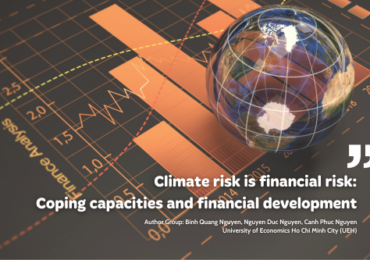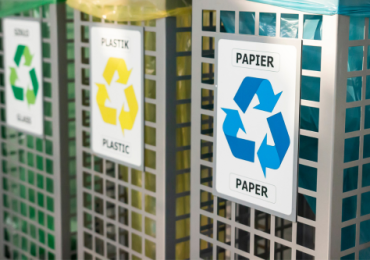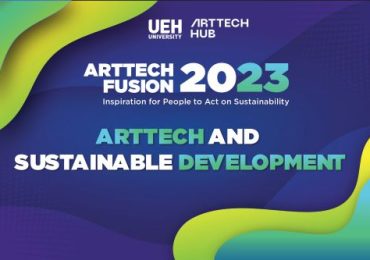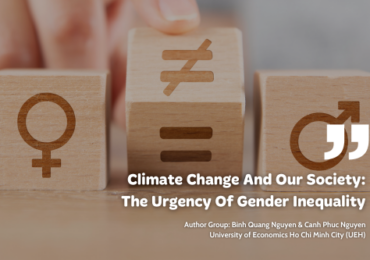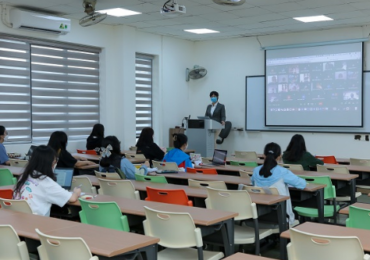[Research Contribution] The Impact of “Greenwashing” on Green Consumption Intentions Among the Young Generation
28 August, 2025
Keywords: Greenwashing; green products; green consumption intention; youth
Amid the influence of social media and the green consumption wave, consumers today have greater access to and scrutiny over brand information, particularly regarding corporate social and environmental responsibility. This compels businesses not only to communicate sustainability effectively but also to act genuinely in favor of sustainable development. However, in practice, many companies use “green” messaging in a superficial or misleading manner – commonly referred to as “greenwashing” – causing consumers to question and lose trust in brands. In response to this context, a study by a researcher from the University of Economics Ho Chi Minh City (UEH) analyzed how young consumers perceive and react to greenwashing behavior, thereby clarifying its impact on sustainable consumption intentions.

Research Context
The use of green products is a pressing issue, especially in today’s environmentally conscious era (Testa et al., 2020). Many companies advertise their products as environmentally friendly, but often these claims are exaggerated or unfounded (Laufer, 2003). Prior research shows that while green advertising can attract consumers, not all such messaging is trustworthy (Chen & Chang, 2013). Moreover, the concept of greenwashing remains relatively new to consumers (Parguel et al., 2011), and many are unaware they may be influenced by deceptive “green” claims (Rahman et al., 2015).
While previous studies have explored the factors affecting green consumer behavior, few have examined the specific impact of greenwashing on consumer attitudes toward sustainability, or how feelings of betrayal influence continued green purchasing intentions. This research aims to fill that gap, investigating green consumption intentions through the lens of environmental awareness and trust, while providing consumers with clearer insights into sustainable consumption behavior.
Conceptual Clarifications
Green consumption intention is defined as a consumer’s willingness to purchase environmentally friendly products. According to Lasuin and Ng (2014), it reflects the desire and readiness to support products with “green” attributes. Aman et al. (2011) also describe it as a tendency to value and choose environmentally friendly goods.
Greenwashing is a term coined by Parguel, Benoît-Moreau, and Larceneux (2011) to describe false or misleading claims by companies about the environmental friendliness of their products or brand. Lyon and Montgomery (2015) describe it as deceptive marketing, making consumers believe the company engages in sustainable practices when it does not.
Consumer attitude reflects knowledge, emotions, intentions, and readiness to purchase and use a product (Zhang & Sun, 2021). Based on the Theory of Reasoned Action (Fishbein & Ajzen), attitude refers to an individual’s positive or negative evaluation of an object or behavior.
Perceived betrayal is the emotional state experienced by consumers upon realizing they have been misled by a brand. According to Ittefaq et al. (2024), under the Stimulus–Organism–Response theory, perceived betrayal acts as a key mediating factor between brand-induced stimuli and consumer behavioral responses. This betrayal can trigger negative emotions such as disappointment or ethical conflict, leading to brand avoidance, rejection, or negative word-of-mouth.
From a marketing perspective, greenwashing is a tactic to boost a brand’s positive image. However, consumer awareness of greenwashing – their ability to detect exaggerated or false environmental claims – plays a significant role in shaping their response. Research (e.g., Gao et al., 2012) shows that increased awareness of greenwashing strengthens the sense of betrayal, fueling stronger negative reactions.
Research Hypotheses
- H1: Consumer awareness of greenwashing positively affects perceived betrayal
- H2: Awareness of greenwashing negatively impacts green consumption intention
- H3: Awareness of greenwashing negatively affects attitudes toward the sustainability of green products
- H4: Perceived betrayal negatively impacts green consumption intention
- H5: Attitudes toward sustainability positively influence green consumption intention
Methodology and Findings
Using the Theory of Reasoned Action, the study surveyed a sample of 352 young consumers to assess the influence of greenwashing on their attitudes and intentions toward sustainable products. The results confirm that consumer awareness of greenwashing has a negative impact on both green consumption intentions and attitudes toward product sustainability. In other words, the more consumers recognize a company’s greenwashing behavior, the less likely they are to continue purchasing its products.
In the digital age, where information is more accessible, consumers can more easily distinguish genuine environmental actions from superficial claims. Therefore, companies must avoid greenwashing to prevent loss of trust and sales. The study also confirms that perceived betrayal negatively impacts purchase intentions—once consumers feel deceived, they are unlikely to buy again from that brand.
Moreover, both perceived betrayal and consumer attitude serve as mediators in the relationship between greenwashing awareness and continued purchase intention.
Practical Implications
This study enriches the theoretical framework on consumer psychology in response to green marketing. It offers a new perspective for future research on green consumption and provides valuable insights for managers and marketers. While greenwashing may yield short-term gains, it can result in serious long-term consequences and is not a sustainable marketing strategy.
Businesses are therefore advised to avoid misleading claims and instead invest in authentic, transparent environmental actions that reflect genuine corporate social responsibility.
Full article: The Impact of Greenwashing on Green Consumption Intentions Among the Young Generation – [READ HERE]
Author: Dr. Do Thi Hai Ninh – University of Economics Ho Chi Minh City
This article is part of the UEH Research Contribution For All series, promoting applied research and knowledge dissemination. Stay tuned for the next edition of UEH Research Insights.
News and photos: Author, UEH Department of Communications and Partnerships

[Podcast] Recommendations for University education development
14 February, 2025
[Podcast] Developing Vung Tau into a World-Class Tourism City
16 January, 2025
[Podcast] Postdigital Design Strategies for Media Art
6 January, 2025
[Podcast] NFTs – Artistic Innovation or Just a New Hype?
27 December, 2024
[Podcast] Boosting Employee Creativity with Constructive Feedback
23 November, 2024
[Podcast] “Dutch Disease” in Remittances and the Case of Vietnam
4 November, 2024
[Podcast] Latest approaches for sustainable universities
11 July, 2024
Data Law – Part 1: Necessity for a New Approach
18 May, 2024
Advertising Evaluation on Tiktok Platform
14 May, 2024
[Podcast] Advertising Evaluation on Tiktok Platform
13 May, 2024
Promoting Learner Autonomy in English Language Learning (Part 1)
24 November, 2023
ArtTech And Sustainable Development
27 October, 2023
Motivation of EFL Vietnamese Students in Economics-related Majors
12 October, 2023
Climate Change And Our Society: The Urgency Of Gender Inequality
12 October, 2023
People Analytics in Vietnam
10 March, 2022
Revolution in Experimental Economics
30 January, 2022
The Sharing Economy: Governance Issues in Vietnam
24 January, 2022
Employment Policy For Ho Chi Minh City in Post-social distancing Period
28 December, 2021
Lifelong learning at UEH: Towards a Sustainable University
28 December, 2021
Building a Decentralized Stock Market based on Blockchain Technology
24 December, 2021
Consumer price index from big data mining perspective (Big data)
17 November, 2021
Overview Of Digital Currency – Part 5: DIEM Private Stabilized Currency
11 November, 2021

































































































































































